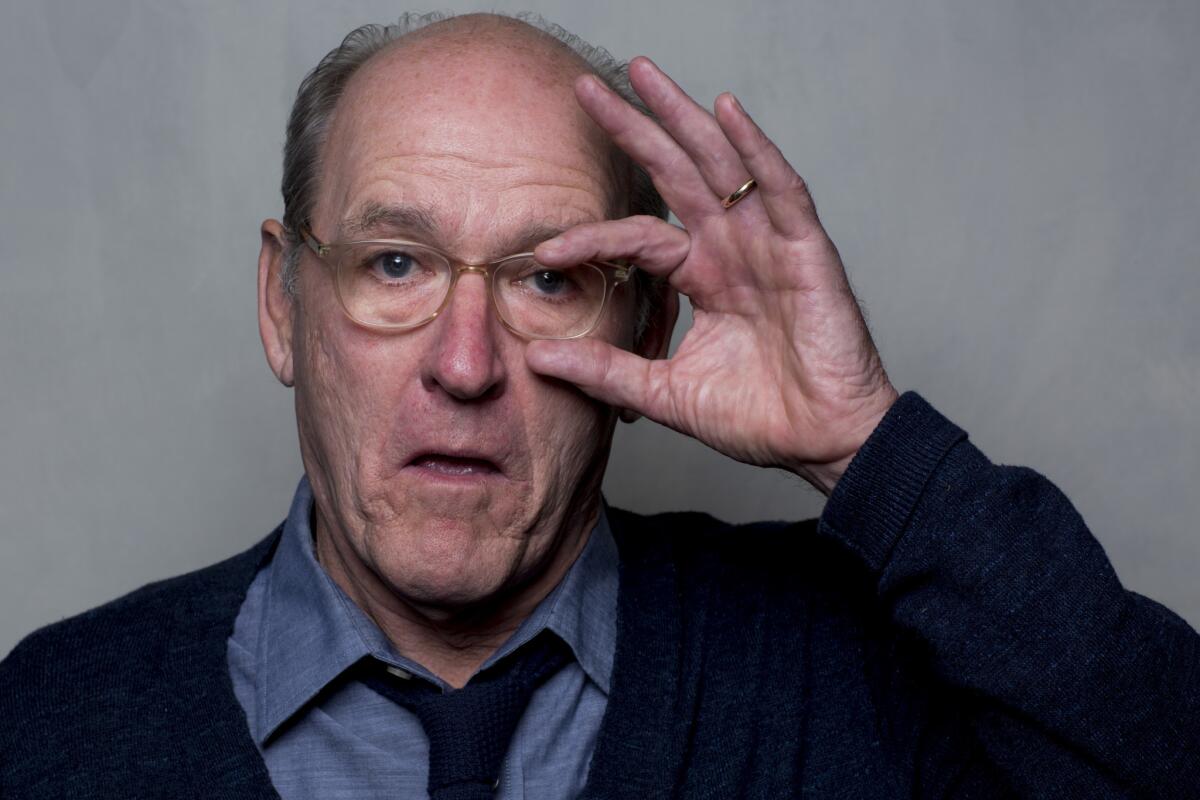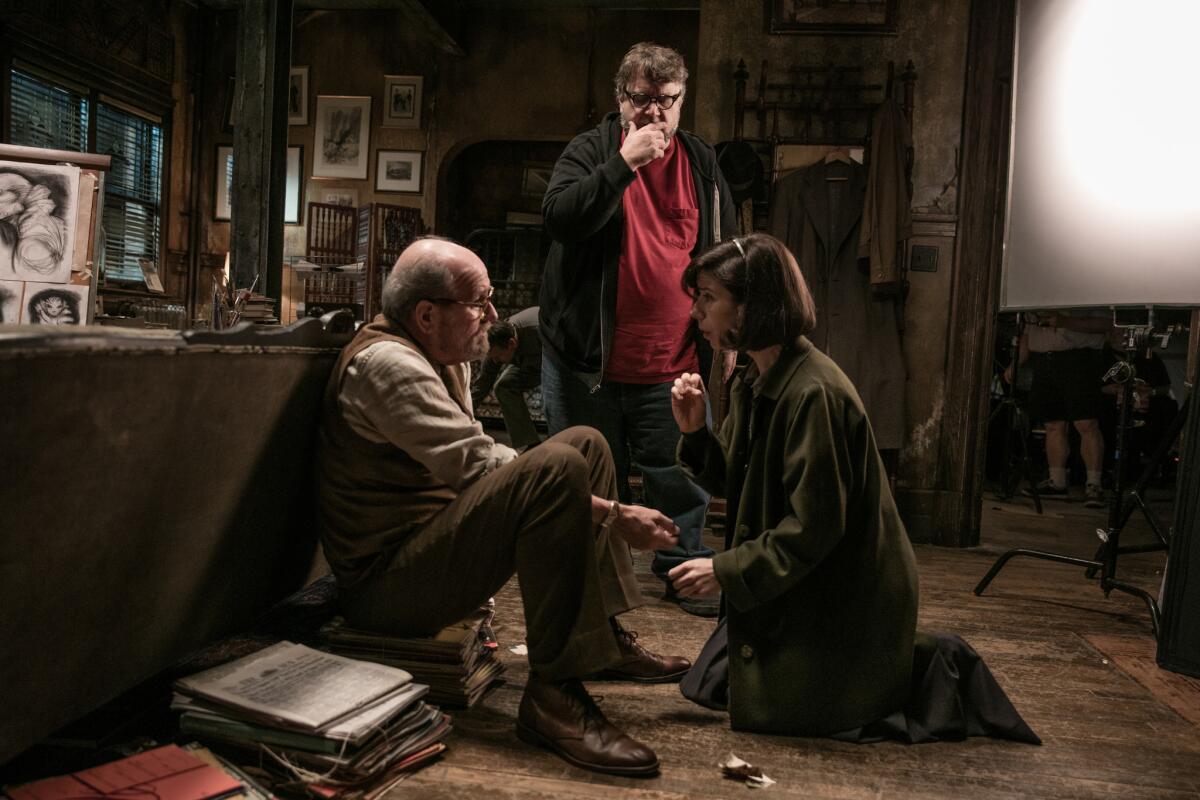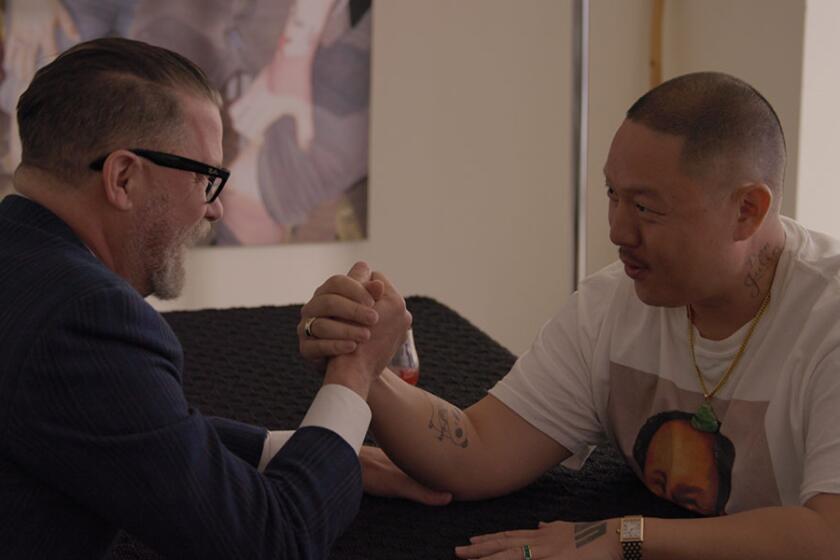Q&A: ‘The Shape of Water’ Golden Globe nominee Richard Jenkins on the mastery of Guillermo del Toro and loving Sally Hawkins

With 70-odd movies and a couple of dozen TV projects under his belt, Richard Jenkins gets recognized fairly often. Still, when people stop him on the street or tap him on the shoulder on an airplane, they can’t always quite place him.
“I get a lot of: ‘Did we go to high school together?’ ” says Jenkins. “They’ll say, ‘What’s your name?’ ‘Richard.’ ‘Are you sure?’ ‘Pretty sure.’ ”
One of Hollywood’s most respected and in-demand character actors, Jenkins first broke out in the early 2000s as the patriarch on the HBO drama series “Six Feet Under” and went on to earn an Oscar nomination for the 2008 film “The Visitor” and an Emmy for the 2015 miniseries “Olive Kitteridge.” Now at age 70, he has landed in the heart of awards season again, earning Golden Globe and Screen Actors Guild nominations for his supporting turn in director Guillermo del Toro’s fantastical fable “The Shape of Water.”
Heading into the Golden Globe Awards on Jan. 7, “The Shape of Water” leads the movie field with seven nominations, including best picture in the drama category. In the film, Jenkins plays Giles, a kind-hearted illustrator who helps his neighbor, a mute janitor who works in a government laboratory (Sally Hawkins), as she tries to rescue an aquatic humanoid creature with whom she has fallen in love.
In September, the morning after “The Shape of Water” received a rapturous reception at the Telluride Film Festival in Telluride, Colo., Jenkins sat down with The Times to talk about the movie and about his journey from “the exposition guy” to one of the best roles of his career.
Giles is kind of an enigmatic character at first, and as the movie goes along we gradually learn more and more about what makes him tick. Was that fun for you to play?
That’s what I loved about it. A lot of times the script wants the audience to know everything about the character all the time. But Giles is not there as a plot device. He has his own world. This is a human being who is dealing with his life, and you’re watching it.
You see less and less of that in the writing these days. Most movies are written for just the star, and the supporting characters don’t have their own lives. They’re there to move the story along.
As a character actor, you must get a fair amount of that.
Especially when you’re starting out, a lot of times you’re “the exposition guy.” My favorite is when you’re talking to your brother in a movie and it’s like, “You’re my brother. Do you remember last year when our mom died?” It’s like, who am I telling this to? He doesn’t know this? [laughs] It ends up that about 80% of what you’re saying is talking to the audience and only about 20% is to the other person.
This isn’t that. Every character has their own life and you find out who we are as we go.

Did you and Guillermo have conversations about what Giles’ back story might be?
Guillermo had a back story for Giles, but he said, “Take it or leave it. You’re playing him.” I like to take everything from the page. I’ve had situations where people say things like, “Your character hated his brother.” I say, “Is it in the movie?” “No.” “Then what do I care?” If it’s in the movie, I care about that. But there were tons of clues in this script, and once I saw Giles’ apartment and the costumes, that spoke volumes.
You share nearly all of your scenes with Sally, whose character communicates through sign language. Was it a challenge to get into a rhythm with her without spoken words to bounce off?
Well, I’m an actor: “You mean I get all the dialogue? Why, thank you!” [laughs] Though of course, a lot of the time it’s not my dialogue — it’s hers that I’m saying back to her.
My first problem was, you can’t get ahead of her. You can’t say things until she signs them. I found myself looking at her more than I usually do. In life, you don’t always look at each other but since she didn’t talk, I always looked at her face — and her face just takes you in. She’s amazing. I loved her from the day I met her.
And what was it like acting opposite Doug Jones in his creature suit?
The first scene I did with him was when I’m sketching him in the bathtub. I remember before we shot, Doug was in the bathtub and I was thinking, “I don’t know — it looks like a guy in a fish suit sitting in a bathtub to me.” Then they said, “Action” — and suddenly he changed. It was like, whoa! It was very cool.
This guy was entombed in this suit for 15 hours a day. He had to eat and drink through a straw. I think they put one of his stunt doubles inside of the costume at one point and he threw up inside it because it was so claustrophobic. Doug was just … wow. And he had a nice ass. You have to have a nice ass if you’re going to get the girl to fall for you. [laughs]
When you start hearing your name being buzzed about in the awards season conversation, is it hard to tune that out?
Well, what am I going to do? I have no control over anything. I’m like Giles: “Who am I? I’m nobody.”
But it’s been great. I love the movie and I love Guillermo. This is the closest I’ve ever gotten or ever will get to working with a Hollywood master. This guy is an artist and he knows how to speak in film language. It seemed like we were in the ’40s. I was waiting for Spencer Tracy to walk around the corner — it was that kind of shooting experience.
The truth is, I’m 70, and this movie has a real chance to be here for a long time. It’s hard to find something like that. The odds are not good. I didn’t do my first movie until I was 35 or 36. It’s a hard business to crack.
Every time I bitch and moan, I think, “If somebody had told me when I was 21 that this was going to be my life, I would have kissed the ground.” What do I have to complain about? I’m very grateful.
Twitter: @joshrottenberg
ALSO
Review: Guillermo del Toro's 'The Shape of Water' is the true wonder of awards season
Only good movies
Get the Indie Focus newsletter, Mark Olsen's weekly guide to the world of cinema.
You may occasionally receive promotional content from the Los Angeles Times.








